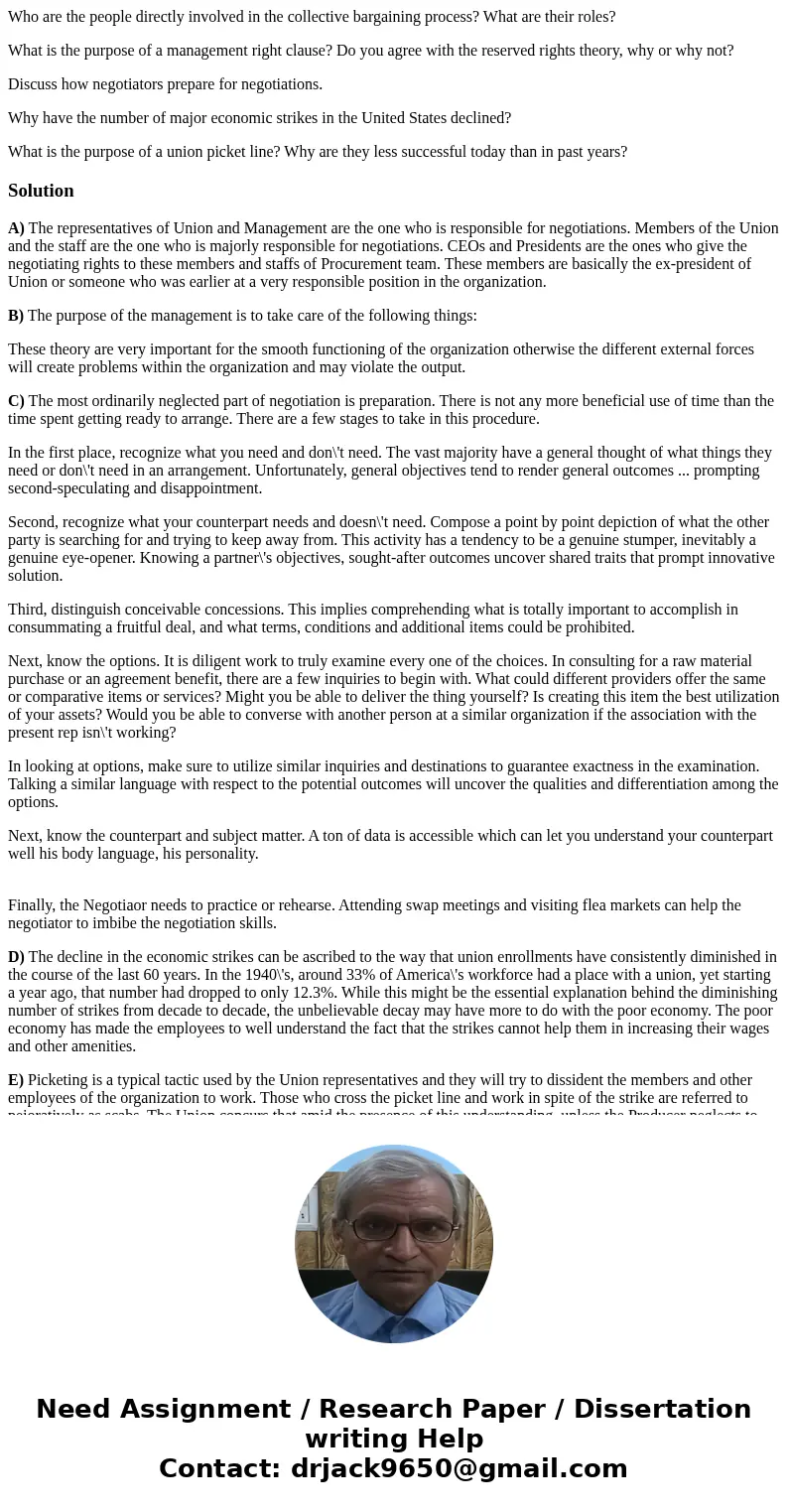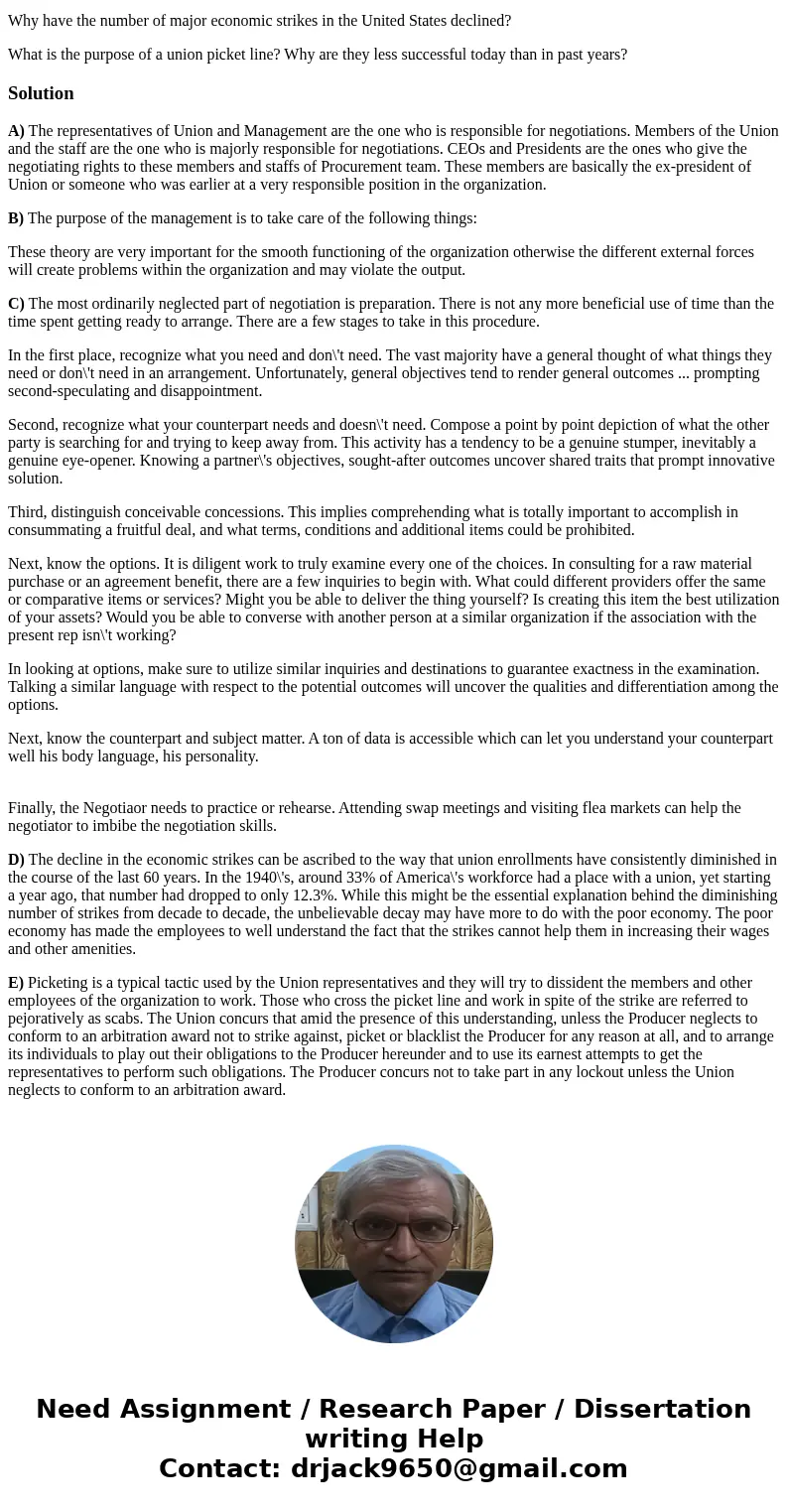Who are the people directly involved in the collective barga
Who are the people directly involved in the collective bargaining process? What are their roles?
What is the purpose of a management right clause? Do you agree with the reserved rights theory, why or why not?
Discuss how negotiators prepare for negotiations.
Why have the number of major economic strikes in the United States declined?
What is the purpose of a union picket line? Why are they less successful today than in past years?
Solution
A) The representatives of Union and Management are the one who is responsible for negotiations. Members of the Union and the staff are the one who is majorly responsible for negotiations. CEOs and Presidents are the ones who give the negotiating rights to these members and staffs of Procurement team. These members are basically the ex-president of Union or someone who was earlier at a very responsible position in the organization.
B) The purpose of the management is to take care of the following things:
These theory are very important for the smooth functioning of the organization otherwise the different external forces will create problems within the organization and may violate the output.
C) The most ordinarily neglected part of negotiation is preparation. There is not any more beneficial use of time than the time spent getting ready to arrange. There are a few stages to take in this procedure.
In the first place, recognize what you need and don\'t need. The vast majority have a general thought of what things they need or don\'t need in an arrangement. Unfortunately, general objectives tend to render general outcomes ... prompting second-speculating and disappointment.
Second, recognize what your counterpart needs and doesn\'t need. Compose a point by point depiction of what the other party is searching for and trying to keep away from. This activity has a tendency to be a genuine stumper, inevitably a genuine eye-opener. Knowing a partner\'s objectives, sought-after outcomes uncover shared traits that prompt innovative solution.
Third, distinguish conceivable concessions. This implies comprehending what is totally important to accomplish in consummating a fruitful deal, and what terms, conditions and additional items could be prohibited.
Next, know the options. It is diligent work to truly examine every one of the choices. In consulting for a raw material purchase or an agreement benefit, there are a few inquiries to begin with. What could different providers offer the same or comparative items or services? Might you be able to deliver the thing yourself? Is creating this item the best utilization of your assets? Would you be able to converse with another person at a similar organization if the association with the present rep isn\'t working?
In looking at options, make sure to utilize similar inquiries and destinations to guarantee exactness in the examination. Talking a similar language with respect to the potential outcomes will uncover the qualities and differentiation among the options.
Next, know the counterpart and subject matter. A ton of data is accessible which can let you understand your counterpart well his body language, his personality.
Finally, the Negotiaor needs to practice or rehearse. Attending swap meetings and visiting flea markets can help the negotiator to imbibe the negotiation skills.
D) The decline in the economic strikes can be ascribed to the way that union enrollments have consistently diminished in the course of the last 60 years. In the 1940\'s, around 33% of America\'s workforce had a place with a union, yet starting a year ago, that number had dropped to only 12.3%. While this might be the essential explanation behind the diminishing number of strikes from decade to decade, the unbelievable decay may have more to do with the poor economy. The poor economy has made the employees to well understand the fact that the strikes cannot help them in increasing their wages and other amenities.
E) Picketing is a typical tactic used by the Union representatives and they will try to dissident the members and other employees of the organization to work. Those who cross the picket line and work in spite of the strike are referred to pejoratively as scabs. The Union concurs that amid the presence of this understanding, unless the Producer neglects to conform to an arbitration award not to strike against, picket or blacklist the Producer for any reason at all, and to arrange its individuals to play out their obligations to the Producer hereunder and to use its earnest attempts to get the representatives to perform such obligations. The Producer concurs not to take part in any lockout unless the Union neglects to conform to an arbitration award.


 Homework Sourse
Homework Sourse